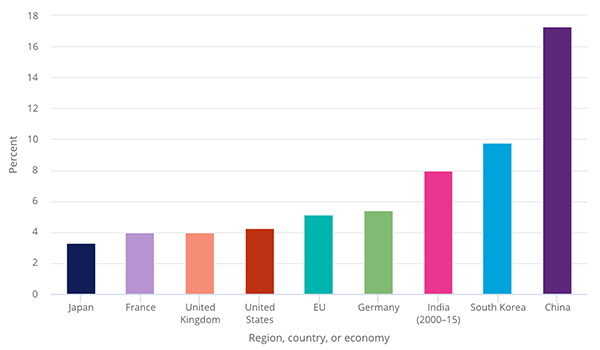China overtaking US as global research leader
January / February 2020 | Volume 19, Number 1
U.S. scientific and engineering investment has dropped relative to the rest of the world, while spending has risen rapidly in a number of Asian countries, according to
The State of U.S. Science and Engineering 2020, a new report from the National Science Board (NSB). China alone accounts for nearly a third of the increase in global research and development (R&D) growth since 2000, the NSB says, and is “on a path to soon become the world’s largest R&D performer.”
In assessing math and science test scores of elementary and secondary school students, the study found U.S. education is “mediocre and stagnant relative to other countries.” The U.S. has long relied on foreign-born talent for science and engineering (S&E) expertise, with more than a third of doctoral degrees going to international students. The report notes “a startling shift” in foreign student enrollment in U.S. colleges and universities, which has slowed since 2016.
Average annual growth rate of domestic R&D expenditures: 2000–2017

Chart source and full data:
Indicators 2020: R&D, Figure 13
Although the number of U.S. women and minorities with degrees in S&E has grown dramatically since the mid-1990s, these increases were outpaced by the rapid expansion of S&E jobs, leaving women and minorities continuing to be underrepresented relative to their proportions in the U.S. population.
While the U.S. continues to spend more on R&D than any other country - $548 billion in 2017 - the federal government’s share has declined over the last 20 years.
Globally, R&D funding has tripled in the last 20 years, “which is good for humanity because science is not a zero-sum game,” said NSB Chair Diane Souvaine. “However, it also means that where once the U.S. was the uncontested leader in S&E, we now are playing a less dominant role in many areas.”
More Information
To view Adobe PDF files,
download current, free accessible plug-ins from Adobe's website.